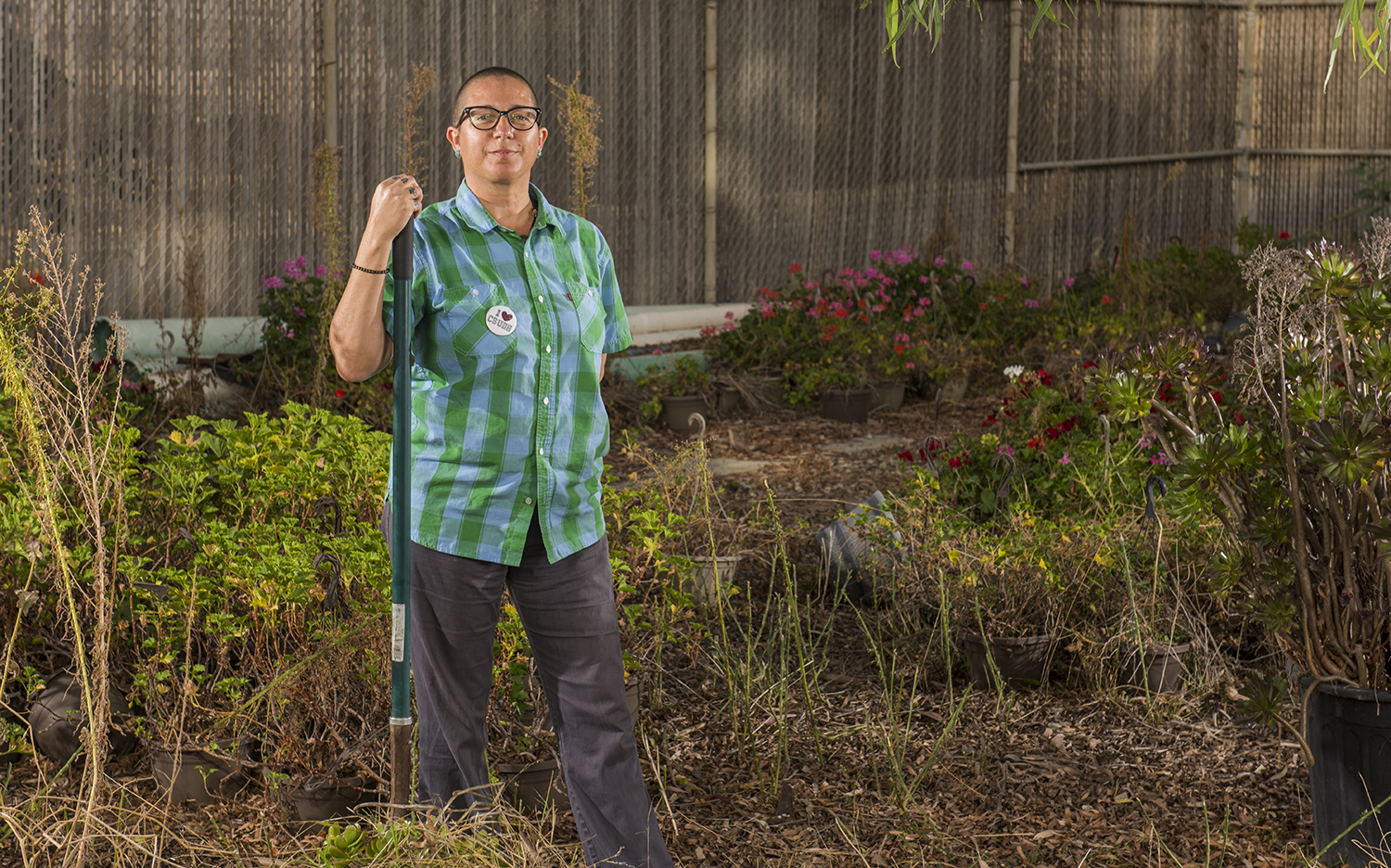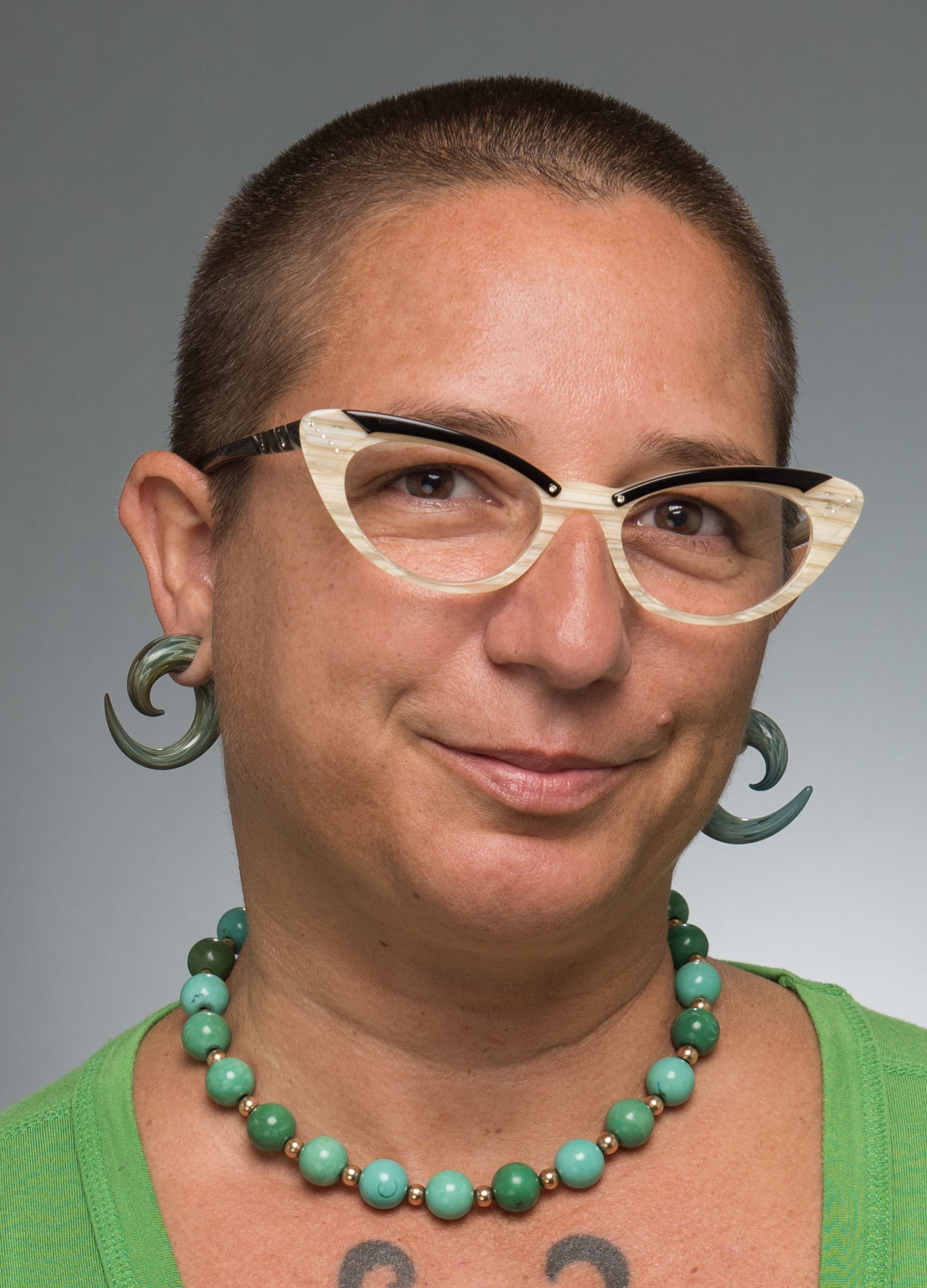
During a break at a Hollywood restaurant where they prepared sumptuous cuts of meat, lobster, pâté, and colorful cheese and fruit platters, California State University, Dominguez Hills (CSUDH) graduate student Hawk McFadzen recalls spending their time filling out paperwork to apply for food stamps for their children.
“We [restaurant employees] could never afford to eat where we worked, or even eat well after work because we were also dealing with what’s called time poverty. Whether we were buying fresh fruits and vegetables or not, we wouldn’t have time to prepare them,” said McFadzen, who identifies as a gender non-binary person.
McFadzen had worked in the food service industry for more than 20 years. The stark contrast between their (McFadzen prefers non-gender pronouns) work in high-end restaurants and the realities of living in South Los Angeles, a predominantly Black and Latinx area that is considered a food desert with limited access to affordable and nutritious food, particularly for low-income residents, has made McFadzen disillusioned by the disparity between who can afford to eat well and who cannot.

McFadzen’s experiences with food insecurity encouraged them to start volunteering. They have worked at a variety of health and social justice organizations, such as SoLA Food Co-Op, and participated in a parents’ collaborative that worked with Choose Health LA Kids.
“Within the families that we met through my volunteer work we have witnessed a genuine concern, and have really felt their passion for change,” she said. “For me, as an outsider the neighborhood, I had been conditioned and raised to believe that poor and working-class people of color didn’t have much concern about health or eating–that it is not even on the radar. I have learned that’s completely false.”
For their work helping address food disparity in South L.A., McFadzen, a graduate student in the Master of Sociology program at CSUDH, where they also earned a bachelor’s degree in sociology and double minors in Africana studies and Chicana/o studies, has been honored with the CSU Trustees’ Award for Outstanding Achievement. The annual award goes to one student at each CSU campus who demonstrates superior academic performance, personal accomplishments, community service, and financial need.
A military veteran who served six years in the U.S. Marine Corps Reserve, McFadzen also was named the Trustee Award’s Wells Fargo Veteran Scholar, which comes with a $6,000 prize.
“It was such an honor to be recognized for the work I’ve been doing. I will put all the money toward books and other things needed to help me get through college,” said McFadzen, who was also a Presidential Scholar during their undergraduate years at CSUDH. “I can really use the financial help since I’m raising three kids. It’s a very affirming and positive feeling being the recipient of such generosity.”
In 2015 McFadzen was accepted into a community-based participatory research (CBPR) training fellowship offered by the Los Angeles-based Community Health Council. The fellowship is funded through the Centers for Disease Control and Prevention’s Racial and Ethnic Approaches to Community Health (REACH) program to reduce racial and ethnic health disparities.
The fellowship provided McFadzen a comprehensive perspective on the potential of CBPR and is what inspired them to return to college and pursue a career in the field.
“Before CBPR, I had never heard of researchers utilizing residents as experts in their own situations. If they were consulted at all, it was typically to provide feedback on research that had already been completed,” said McFadzen. “With CBPR, before you even name the research the residents are there to say these are the problems they have, what they would like to change, and how resources should be directed. At the end, the residents’ names appear in the research reports.”
As an undergraduate, McFadzen was active in advocating, planning and establishing CSUDH’s Urban Farm, which saw its first crops planted during the spring 2018 semester. A perfect fit for their career aspirations, the farm is a multidisciplinary living laboratory that provides a venue for faculty to engage students not only in organic gardening and urban horticulture techniques, but also in discussions about larger societal issues around sustainability, and access to healthy food choices in urban environments.
McFadzen briefly served as the Urban Farm’s intern and coordinator. They have since moved on to become the CalFresh (formerly known as food stamps) outreach coordinator at CSUDH, working to assist students in signing up for the Supplemental Nutrition Assistance Program (SNAP) benefits.
In their master’s program at CSUDH, McFadzen is developing a theory for what they call “decolonial feminisms of food justice,” and how to apply it to the area food policy research. In May 2018, a paper of their research titled “Food Access and Urban Agriculture Toward Sovereignty” garnered third place at the Terry Kershaw Student Essay Contest at the National Conference for Black Studies.
“I’m combining existing theories that relate to what exactly constitutes food justice and how we might work toward that in a way that centers women and families, while de-centering colonization and the colonial European mindset,” said McFadzen. “My work also honors indigenous people and indigenous ways and traditions that existed before capitalism. It looks at how this affects food justice, such as what it looked like when everyone got to eat and there wasn’t a focus on profit.”
Community-based participatory research is now McFadzen’s primary career focus, and they are interested in applying to a university that offers an urban planning program, working closely with the LA Food Policy Council with CBPR as a general practice.
“While in the CBPR fellowship, I watched the people who were running our workshops, meetings, and even award ceremonies and thought I want to be that person. I want to help guide this mission and be the link between the resources, the policies, and the people,” said McFadzen. “Ultimately, I want to be working in policy, specifically using community-led research to craft policies that protect alternative food systems across South Los Angeles and other disinvested communities.”